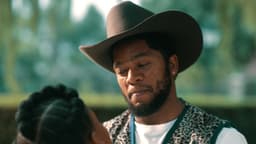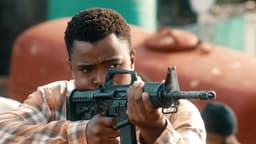
Decoding the Monolith for sci-fi fans
Horror movies bring our fears to life. Frankenstein and its descendants are tales of scientific hubris. Zombie tales sprout from fears of exploitation that won’t let even the dead rest. And vampires are the rich and powerful sucking the life out of the poor. Now it seems horror has a new monster…the podcaster. Their victim? The truth.
In the new sci-fi thriller Monolith, the first episode of an anonymous disgraced journalist’s (Lily Sullivan) podcast, titled BeyondBelievable, centres on strange objects she refers to as “Mystery Bricks”, which seem to link to people having visions of despair. Identified only as The Interviewer, she begins by telling her listeners, “I want to tell you a story, all you have to do is listen.” And she sets off on the trail of a conspiracy theory. But bit by bit, the trail is going to lead her right back to her own doorstep. As for the truth, that’s complicated.
Watch the trailer for Monolith
Podcast privilege

“Truth is no longer the great monolith that underpins the world; power is. History is written by the victors, and indeed, truth is written by the powerful. Those who can control the narrative, control the world. The powerful will bend – or even destroy – the truth rather than give up their power,” warns Monolith director Matt Vesely.
“Our Interviewer is a woman of immense privilege. She claims to seek the truth – but does so only so far as it benefits her. Her podcast is the modern paradigm of a self-aggrandising narrative: though presented as truth, it is, in fact, very carefully cultivated.” And when that narrative is challenged, Matt reveals that the results are predictable.
“The Interviewer hunts for a sinister purpose behind the visions of despair that plague her subjects, but when the truth of that despair is revealed to be the crimes upon which her family’s privilege is built, she repeats the cycle of so many before her: she hides from that truth, buries it, instead choosing to live in ignorance rather than risk the life she leads,” says Matt. “The Western World itself is built on these crimes – colonisation, exploitation, domination – and only continues to exist as-is through willful ignorance.”
The monster in the closet

“I was excited to tell such a provocative story in an exciting genre wrapping. If we ever got too bogged down in metaphor, we always made sure to remind ourselves, ‘This is a sci-fi adventure! Keep it interesting and bold! Go all-in!’” says Monolith writer Lucy Campbell. “We were challenged to push the film as hard as we could, to really see how dark and strange the film could become. I pushed myself into the dark, otherworldly abyss … Monolith is the kind of sci-fi that I’ve always wanted to write: real-world and identifiable, strange and unnerving.
“At the heart of Monolith is a simple story about a woman discovering her own family truths and the realities of the privilege that her life has been built on,” says Lucy, who includes invisible privileges like “forgetting, moving on and avoiding,” all of which The Interviewer is able to do as she retreats to her parents’ house when life doesn’t go according to her plans.
One woman, one set, one microphone

Monolith was filmed on a micro budget over 15 days, with just one cast member on screen, and one location. And that meant the location, an ultra modern house in Adelaide Hills, Australia, had to do a lot of heavy lifting. Production designer Jonah Booth-Remmer created The Interviewer’s family home to highlight that she’s wealthy, liberal, and privileged. And the creative team spoke to real-life podcasters and audio engineers to make sure that The Interviewer had top of the line podcasting gear for the job, which she excels at, despite her ethical issues.
“Throughout the house there are references to colonisation, the accumulation of artefacts and artworks from cultures around the world that have been put on display in this affluent home like trophies; beautiful objects that are nonetheless symbols of colonialism and invasion,” hints Monolith producer Bettina Howard.
The language of the monolith

As The Interviewer studies the Mystery Bricks, she unearths all kinds of symbols, which were created for Monolith by designer Raynor Pettge, and based on influences from ancient African script to electrical diagrams.
While The Interviewer believes they contain an extraterrestrial message, Bettina hints that “They are revealed to be personal scars, emotional language….These symbols, as well as the black bricks and the haunting visions that accompany them, skirt the edges of understanding. The film’s audience is asked to seek meaning within these strange cyphers, but in truth, the only meaning they can take away will be their own. Monolith explores questions of truth, conspiracy, and the fact that each of us sees what we want to see – and believes what we want to believe.”
More like this

South Africa’s stories and storytellers recognised as SAFTA nominees announced
Mzansi’s boldest stories take centre stage as the 2026 SAFTA nominees are unveiled, with a wave of nominations across DStv and Showmax.

Heart Eyes (2025)
In this whodunit horror slasher, Valentine's Day is turned into a battle for survival as a masked serial killer goes after couples.

Bride Hard (2025)
When a mercenary team hijacks a wedding, a secret agent bridesmaid fights to save the day in this chaotic action comedy.

Friendship (2024)
Tim Robinson and Paul Rudd lead this dark comedy about an awkward man trying to be friends with his charismatic neighbour.

Sweethearts (2024)
Two college freshmen make a pact to break up with their high school sweethearts during the "Drunksgiving" holiday break, but their plan goes awry.

How M3GAN 2.0 blurred the lines between human and AI
Allison Williams, Ivanna Sakhno and M3GAN 2.0 writer-creator Gerard Johnstone talk about how the back-and-forth between humans, robots, and AI turned creepy on set.

M3GAN 2.0 (2025)
Killer doll M3GAN is resurrected to face a new threat: Amelia, a military-grade robot created using M3GAN's technology.

The Naked Gun (2025)
In this slapstick comedy reboot, Frank Drebin Jr follows in his father's footsteps to prevent the closure of Police Squad.
Outlaws, now streaming on Showmax
Go on holiday with RHUGT: Africa
More enthralling movies to stream

Jojo on The Real Housewives Ultimate Girls Trip: Africa reunion, social media backlash and more
Jojo opens up about the highly anticipated reunion for The Real Housewives Ultimate Girls Trip: Africa, coming to Showmax on 20 and 27 February.

South Africa’s stories and storytellers recognised as SAFTA nominees announced
Mzansi’s boldest stories take centre stage as the 2026 SAFTA nominees are unveiled, with a wave of nominations across DStv and Showmax.

Billy Joel: And So It Goes (2025)
An honest, insightful, and deeply moving look at the life and career of acclaimed musician Billy Joel, covering both his struggles and triumphs.

Surviving Mormonism with Heather Gay S1
Former RHOSLC cast member Heather Gay investigates hidden truths within the Mormon church, exposing cracks in its perfect facade.
Latest Stories

Schalk Bezuidenhout trades stand-up for 9-5 in Die Kantoor

A heartbreaking loss: Nolwandle Biyela’s final stand in Outlaws Season 2

Fall in love with romantic drama Touch, now on Showmax

Antonie Marx on Volspoed and why it's a must-watch

Sandra Stein makes her debut on Law, Love and Betrayal S2

Albert Pretorius on Die Kantoor, SA’s re-imagining of The Office

20+ addictive South African reality shows to stream

Where to watch The Real Housewives franchise online

How to Train Your Dragon: Bringing Hiccup and Astrid to life

What to watch on Showmax in January 2026

7 things to know about indie award-winning movie Dìdi

Mission: Impossible – The Final Reckoning’s South African stunts

Die Kwiksilwers (2024)

Where to see the cast of Mpondoland on Showmax

Angel on The Real Housewives Ultimate Girls Trip, Jojo and more

Thandolwethu Zondi on his new role in Outlaws S2
Must-watch trailer for Showmax's turbo-charged reality series Volspoed

The Real Housewives Ultimate Girls Trip cast on first impressions, beefs and more

Fana Mokoena on playing a sangoma in Masinga

Princess Jecoco on The Real Housewives Ultimate Girls Trip Africa

Tlali returns: Outlaws’ most loved and hated villain is back

Novocaine: the US box office hit shot in Cape Town

Why Jackie Phamotse says Slay Queens is a must-watch

Evodia on Ultimate Girls Trip Africa and her return to reality TV







